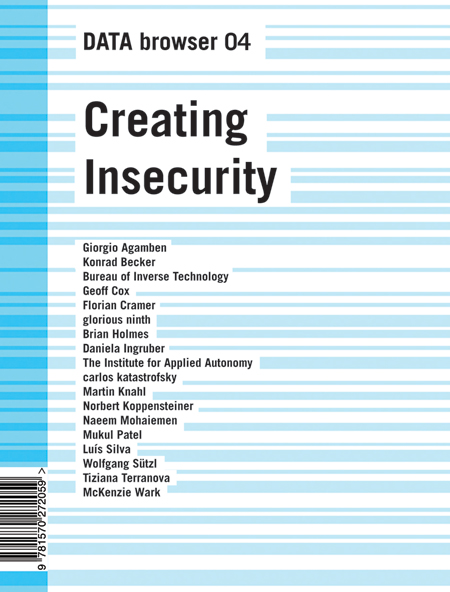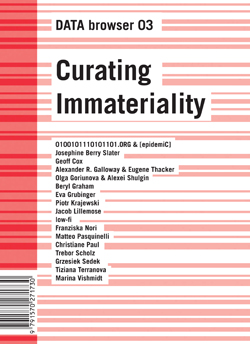Wolfgang Sützl, Geoff Cox (eds.): Creating Insecurity: Art and Culture in the Age of Security (2009)
Filed under book | Tags: · art, biopolitics, floss, free software, internet, knowledge, labour, open source, security, software, technology

“Today we are facing extreme and most dangerous developments in the thought of security. In the course of a gradual neutralization of politics and the progressive surrender of traditional tasks of the state, security imposes itself as the basic principle of state activity. What used to be one among several decisive measures of public administration until the first half of the twentieth century, now becomes the sole criterion of political legitimation. The thought of security entails an essential risk. A state which has security as its sole task and source of legitimacy is a fragile organism; it can always be provoked by terrorism to become itself terrorist.
Following the words of Giorgio Agamben (from his 2001 article “On Security and Terror”), security has become the basic principle of international politics after 9/11, and the “sole criterion of political legitimation.” But security — reducing plural, spontaneous and surprising phenomena to a level of calculability — also seems to operate against a political legitimacy based on possibilities of dissent, and stands in clear opposition to artistic creativity. Being uncalculable by nature, art is often incompatible with the demands of security and consequently viewed as a “risk,” leading to the arrest of artists, and a neutralization of innovative environments for the sake of security.
Yet precisely the position of art outside the calculable seems to bring about a new politicization of art, and some speak of art as “politics by other means.” Has art become the last remaining enclave of a critique of violence? Yet how “risky” can art be?”
Contributions from Giorgio Agamben, Konrad Becker, Bureau of Inverse Technology, Geoff Cox, Florian Cramer, glorious ninth, Brian Holmes, carlos katastrofsky, Martin Knahl, Norbert Koppensteiner, Daniela Ingruber, The Institute for Applied Autonomy, Naeem Mohaiemen, Mukul Patel, Luis Silva, Wolfgang Sützl, Tiziana Terranova, and McKenzie Wark.
Publisher Autonomedia/I-DAT, 2009
Creative Commons license
DATA browser series, 4
ISBN 9781570272059
208 pages
PDFs (updated on 2016-12-12)
Comment (0)Joasia Krysa (ed.): Curating Immateriality: The Work of the Curator in the Age of Network Systems (2006)
Filed under book | Tags: · aesthetics, art, collaboration, curating, database, exhibition, internet, internet art, labour, media art, museum, net art, open source, relational aesthetics, software art, technology

“The site of curatorial production has been expanded to include the space of the Internet and the focus of curatorial attention has been extended from the object to processes to dynamic network systems. As a result, curatorial work has become more widely distributed between multiple agents, including technological networks and software. This upgraded ‘operating system’ of art presents new possibilities of online curating that is collective and distributed — even to the extreme of a self-organising system that curates itself. The curator is part of this entire system but not central to it.
The subtitle of the book makes reference to the essay ‘The Work of Culture in the Age of Cybernetic Systems’ (1988), in which Bill Nichols considered how cybernetics transformed cultural production. He emphasised the shift from mechanical reproduction (symbolised by the camera) to that of cybernetic systems (symbolised by the computer) in relation to the political economy, and pointed to contradictory tendencies inherent in these systems: ‘the negative, currently dominant, tendency toward control, and the positive, more latent potential toward collectivity’. The book continues this general line of inquiry in relation to curating, and extends it by considering how power relations and control are expressed in the context of network systems and immateriality.
In relation to network systems, the emphasis remains on the democratic potential of technological change but also the emergence of what appears as more intensive forms of control. Can the same be said of curating in the context of distributed forms? If so, what does this imply for software curating beyond the rhetoric of free software and open systems?”
Contributors: 0100101110101101.ORG & [epidemiC] | Josephine Berry Slater | Geoff Cox | Alexander R. Galloway & Eugene Thacker | Olga Goriunova & Alexei Shulgin | Beryl Graham | Eva Grubinger | Piotr Krajewski | Jacob Lillemose | low-fi | Franziska Nori | Matteo Pasquinelli | Christiane Paul | Trebor Scholz | Grzesiek Sedek | Tiziana Terranova | Marina Vishmidt
Publisher Autonomedia/I-DAT, 2006
Creative Commons License
DATA browser series, 3
ISBN 1570271739
288 pages
PDF (14 MB, added on 2018-3-29)
PDFs (updated on 2016-12-12)
querelles-net, Rezensionszeitschrift für Frauen- und Geschlechterforschung (2000-2011-) [German]
Filed under journal | Tags: · art, body, economics, education, fashion, gender, history, image, internet, law, literature, music, politics, pornography, religion, science, space, technology, women, youth

querelles-net erschließt die Vielzahl fachspezifischer, inter- und transdisziplinärer Veröffentlichungen im Bereich der Frauen- und Geschlechterforschung/Gender Studies. Wissenschaftliche Rezensionen geben einen Überblick über wichtige Publikationen und aktuelle Forschungsschwerpunkte. Die fortlaufend aktualisierte Bibliographie informiert über die Neuerscheinungen des Feldes.
querelles-net erscheint seit 2000 in Ergänzung zu Querelles. Jahrbuch für Frauen- und Geschlechterforschung (1996 ff.).
querelles-net ist Teil des Publikationsförderprogramms zur Frauen- und Geschlechterforschung an der Freien Universität Berlin.
Redaktionsleitung: Marco Tullney
Redaktion: Valeria Raupach, Anita Runge, Marco Tullney
Published by Freien Universität Berlin
ISSN 1862-054X
Licensed under Creative Commons Attribution 3.0 Germany License (from Issue 2009 / 1)
PDF (Vol 12 Issue 2; 2011; EPUB)
View online (all issues; HTML articles)

